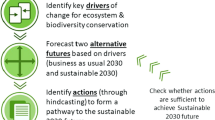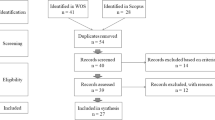Abstract
This research examines the form, social function, and policy implications of customary marine tenure (CMT) in Ngarchelong, a rural and fishery-dependent state in the Republic of Palau. Using ethnography, we find that CMT in Ngarchelong persists in a state of legal pluralism, expanding the normative space for asserting and contesting fishing privileges. Flexible administration of CMT provides benefits to the resident community, including material support from nonresidents and the strengthening of social bonds and networks. A fishery permit system under consideration would redefine fishery access as a privilege granted by government, thereby potentially impacting the social benefits supported by the community’s administration of CMT. With applications beyond Palau, we discuss an alternative management approach that could better harmonize fishery policy with local social context, thereby preserving the social functions of contemporary CMT.
Similar content being viewed by others
Data Availability
The data generated and analyzed in connection with this study are not publicly available in order to protect the confidentiality of individuals who participated in this study. Reasonable requests for data that would not compromise confidentiality will be considered by the corresponding author.
Notes
In the institutional analysis literature, the term “institution” would include formal state laws, such as statutes, as well as traditional laws issued by traditional leaders pursuant to decision-making rules or procedures. For analytical clarity, however, in this paper we generally use the term “law” to refer to formal state laws and laws issued by traditional leaders, reserving the term “institution” for informal rules, norms, and strategies.
References
Adhuri, D. S. (2013). Selling the Sea, Fishing for Power: A Study of Conflict over Marine Tenure in Kei Islands, Eastern Indonesia, Australian National University E Press, Canberra.
Aswani, S. (2002). Assessing the Effects of Changing Demographic and Consumption Patterns on Sea Tenure Regimes in the Roviana Lagoon, Solomon Islands. Ambio 31(4): 272–284.
Aswani, S. (2005). Customary Sea Tenure in Oceania as a Case of Rights-Based Fishery Management: Does it Work? Reviews in Fish Biology and Fisheries 15: 285–307.
Aswani, S. (2017). Customary Management as TURFs: Social Challenges and Opportunities. Bulletin of Marine Science 93(1): 3–12.
Aswani, S., and Ruddle, K. (2013). Design of Realistic Hybrid Marine Resource Management Programs in Oceania. Pacific Science 67(3): 461–476.
Aswani, S., Albert, S., Sabetian, A., and Furusawa, T. (2007). Customary Management as Precautionary and Adaptive Principles for Protecting Coral Reefs in Oceania. Coral Reefs 26: 1009–1021.
Bambridge, T. (2016). Conclusion: What are the lessons to be learned from the rahui and legal pluralism? The political and environmental efficacy of legal pluralism. In Bambridge, T. (ed.), The Rahui: Legal Pluralism in Polynesian Traditional Management of Resources and Territories, Anu Press, Canberra, pp. 227–230.
Berman, P. S. (2009). The New Legal Pluralism. Annual Review of Law & Social Science 5: 225–242.
Carlisle, K. M., and Gruby, R. L. (2018). Why the Path to Polycentricity Matters: Evidence from Fisheries Governance in Palau. Environmental Policy and Governance 28(4): 23–235.
Carrier, J. G. (1987). Marine tenure and conservation in Papua New Guinea. In McCay, B. J., and Acheson, J. M. (eds.), The Question of the Commons, The University of Arizona Press, Tucson, pp. 142–167.
Cinner, J. (2005). Socioeconomic Factors Influencing Customary Marine Tenure in the Indo-Pacific. Ecology and Society 10(1): 36.
Clarke, P., and Jupiter, S. D. (2010). Law, Custom and Community-Based Natural Resource Management in Kubulau District (Fiji). Environmental Conservation 37(1): 98–106.
Cohen, P. J., and Steenbergen, D. J. (2015). Social Dimensions of Local Fisheries Co-management in the Coral Triangle. Environmental Conservation 42(3): 278–288.
Foale, S., Cohen, P., Januchowski-Hartley, S., Wenger, A., and Macintyre, M. (2011). Tenure and Taboos: Origins and Implications for Fisheries in the Pacific. Fish and Fisheries 12: 357–369.
Gelcich, S., Edwards-Jones, G., Kaiser, M. J., and Castilla, J. C. (2006). Co-management Policy Can Reduce Resilience in Traditionally Managed Marine Ecosystems. Ecosystems 9: 951–966.
Graham, T., and Idechong, N. (1998). Reconciling Customary and Constitutional Law: Managing Marine Resources in Palau, Micronesia. Ocean & Coastal Management 40: 143–164.
Gupta, J., and Bavinck, M. (2014). Towards an Elaborated Theory of Legal Pluralism and Aquatic Resources. Current Opinion in Environmental Sustainability 11: 86–93.
Hardy, P. E., Béné, C., Doyen, L., Pereau, J. C., and Mills, D. (2016). Viability and Resilience of Small-Scale Fisheries Through Cooperative Arrangements. Environment and Development Economics 21: 713–741.
Hauck, M. (2008). Rethinking Small-Scale Fisheries Compliance. Marine Policy 32: 635–642.
Hviding, E. (1998). Contextual Flexibility: Present Status and Future of Customary Marine Tenure in Solomon Islands. Ocean & Coastal Management 40(2–3): 253–269.
Jentoft, S. (2000). The Community: A Missing Link of Fisheries Management. Marine Policy 24: 53–59.
Johannes, R. E. (1978). Traditional Marine Conservation Methods in Oceania and Their Demise. Annual Review of Ecological Systems 9: 349–364.
Johannes, R. E. (1981). Words of the Lagoon: Fishing and Marine Lore in the Palau District of Micronesia, University of California Press, Berkeley.
Johannes, R. E. (1982). Traditional Conservation Methods and Protected Marine Areas in Oceania. Ambio 11(5): 258–261.
Johannes, R. E. (1998). The Case for Data-Less Marine Resource Management: Examples from Tropical Nearshore Finfisheries. TREE 13(6): 243–246.
Johannes, R. E. (2002). The Renaissance of Community-Based Marine Resource Management in Oceania. Annual Review of Ecological Systems 33: 317–340.
Kittinger, J. N., Cinner, J. E., Aswani, S., and White, A. T. (2014). Back to the future: Integrating customary practices and institutions into comanagement of small-scale fisheries. In Kittinger, J. N., McClenachan, L., Gedan, K. B., and Blight, L. K. (eds.), Marine Historical Ecology in Conservation: Applying the Past to Manage for the Future, University of California Press, Berkeley, pp. 135–160.
Lieber, M. D., and Rynkiewich, M. A. (2007). Conclusion: Oceanic Conceptions of the Relationship Between People and Property. Human Organization 66(1): 90–97.
Macintyre, M., and Foale, S. (2007). Land and Marine Tenure, Ownership, and New Forms of Entitlement on Lihir: Changing Notions of Property in the Context of a Goldmining Project. Human Organization 66(1): 49–59.
Matthews, E. (2007). Community-Based and Collaborative Management of Coral Reefs and Coastal Resources in Palau (Doctoral Dissertation). University of Rhode Island. Retrieved from http://digitalcommons.uri.edu/dissertations/AAI3284827/. Accessed 23 July 2019.
McCay, B. J., and Jentoft, S. (1998). Market or Community Failure? Critical Perspectives on Common Property Research. Human Organization 57(1): 21–29.
Meinzen-Dick, R. S., and Pradhan, R. (2002). Legal Pluralism and Dynamic Property Rights. CAPRi Working Paper No. 22, International Food Policy Research Institute, Washington D.C.
Moore, S. F. (1978). Law as Process, Routledge & Kegal Paul, London.
Ostrom, E. (2005). Understanding Institutional Diversity, Princeton University Press, Princeton.
Ota, Y. (2006). Custom and Fishing - Cultural Meanings and Social Relations of Pacific Fishing, Republic of Palau, Micronesia (Doctoral Dissertation). University College of London.
Palau Bureau of Budget and Planning. (2017). 2016 Statistical Yearbook. Republic of Palau. Retrieved from http://palaugov.pw/wp-content/uploads/2017/07/2016-Statistical-Yearbook.pdf. Accessed 23 July 2019.
Parlee, C. E., and Wiber, M. G. (2014). Institutional Innovation in Fisheries Governance: Adaptive Co-management in Situations of Legal Pluralism. Current Opinion in Environmental Sustainability 11: 48–54.
Phuc, X. (2007). Fuzzy Property Relations in the Vietnamese Uplands: Ethnography of Forest Access and Control. Journal of Legal Pluralism 55: 73–94.
Prince, J., Victor, S., Kloulchad, V., and Hordyk, A. (2015). Length Based SPR Assessment of Eleven Indo-Pacific coral reef fish populations in Palau. Fisheries Research 171: 42–58.
Putney, R. (2008). Customary Marine Tenure and Traditional Ecological Knowledge in Palau (Masters Thesis). San José State University. Retrieved from https://scholarworks.sjsu.edu/etd_theses/3493/. Accessed 23 July 2019.
Quynh, C. N. T., Schilizzi, S., Hailu, A., and Iftekhar, S. (2017). Territorial Use Rights for Fisheries (TURFs): State of the Art and the Road Ahead. Marine Policy 75: 41–52.
Rohe, J. R., Govan, H., Schlüter, A., and Ferse, S. C. A. (2019). A Legal Pluralism Perspective on Coastal Fisheries Governance in Two Pacific Island Countries. Marine Policy 100: 90–97.
Ruddle, K. (1994). A Guide to the Literature on Traditional Community-Based Fishery Management in the Asia-Pacific Tropics. FAO Fisheries Circular No. 869, Food and Agriculture Organization of the United Nations, Rome.
Ruddle, K. (1996). Boundary Definition as a Basic Design Principle of Traditional Fishery Management Systems in the Pacific Islands. Geographische Zeitschrift 84: 94–102.
Ruddle, K., and Satria, A. (2010). An introduction to pre-existing local management systems in Southeast Asia. In Ruddle, K., and Satria, A. (eds.), Managing Coastal and Inland Waters: Pre-existing Aquatic Management Systems in Southeast Asia, Springer, London/New York, pp. 1–30.
Salim, A. (2010). Dynamic Legal Pluralism in Indonesia: Contested Legal Orders in Contemporary Aceh. Journal of Legal Pluralism 61: 1–29.
Sulu, R. J., Eriksson, H., Schwarz, A.-M., Andrew, N. L., Orirana, G., Sukulu, M., Oeta, J., Harohau, D., Sibiti, S., Toritela, A., and Beare, D. (2015). Livelihoods and Fisheries Governance in a Contemporary Pacific Island Setting. PLoS One 10(11): e0143516. Retrieved from. https://doi.org/10.1371/journal.pone.0143516.
United Nations Development Programme. (2016). Human Development Report 2016, Briefing Report for Palau. Retrieved from http://hdr.undp.org/sites/all/themes/hdr_theme/country-notes/PLW.pdf.
von Benda-Beckmann, F., and von Benda-Beckmann, K. (2006). The Dynamics of Change and Continuity in Plural Legal Orders. Journal of Legal Pluralism 53: 1–44.
Wagner, J., and Talakai, M. (2007). Customs, Commons, Property, and Ecology: Case Studies from Oceania. Human Organization 66(1): 1–10.
Wilen, J. E., Cancino, J., and Uchida, H. (2012). The Economics of Territorial Use Rights Fisheries, or TURFs. Review of Environmental Economics and Policy 6(2): 237–257.
Yin, R. K. (2003). Case Study Research, Design, and Methods, Sage, Thousand Oaks.
Acknowledgements
We wish to thank The David and Lucile Packard Foundation for supporting this work. We also wish to thank our host community in Ngarchelong and all of our research participants in Palau who generously gave of their time and expertise and without whom this research would not have been possible. An earlier version of this manuscript was presented at the 15th Annual Meeting of the American Anthropological Association in Denver, Colorado in 2015, and we thank participants for their comments and feedback.
Funding
This research was funded by a grant from The David and Lucile Packard Foundation.
Author information
Authors and Affiliations
Corresponding author
Ethics declarations
Conflict of Interest
The authors declare that they have no conflict of interest.
Ethical Approval
The Colorado State University Institutional Review Board reviewed and approved the research protocol (Ref. # 14-4942H).
Additional information
Publisher’s Note
Springer Nature remains neutral with regard to jurisdictional claims in published maps and institutional affiliations.
Rights and permissions
About this article
Cite this article
Carlisle, K.M., Gruby, R.L. Customary Marine Tenure in Palau: Social Function and Implications for Fishery Policy. Hum Ecol 47, 527–539 (2019). https://doi.org/10.1007/s10745-019-00094-8
Published:
Issue Date:
DOI: https://doi.org/10.1007/s10745-019-00094-8




